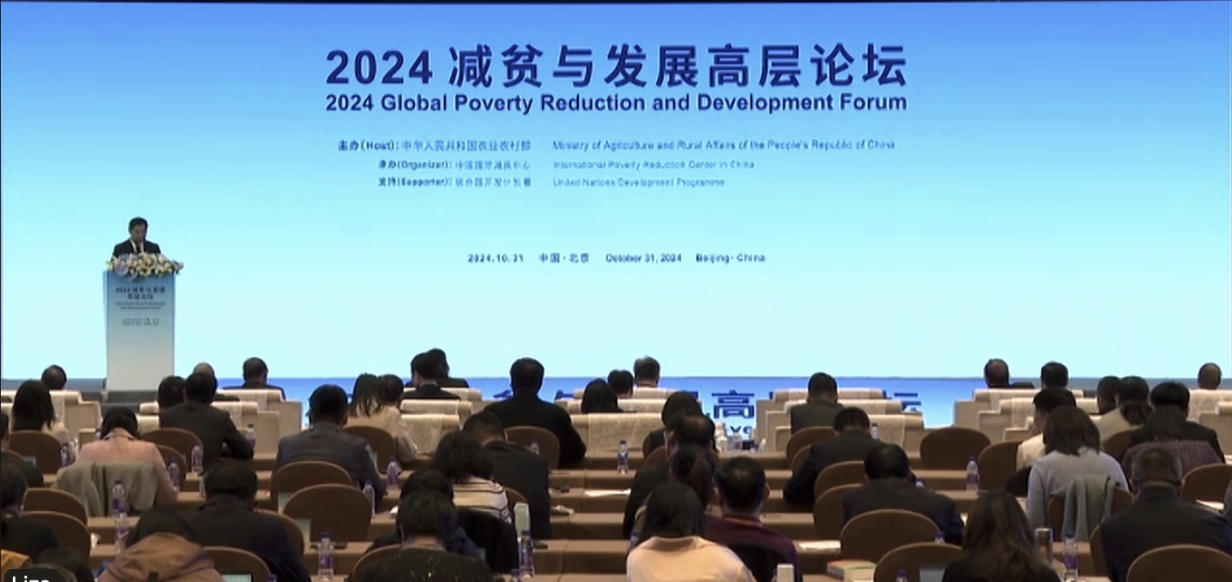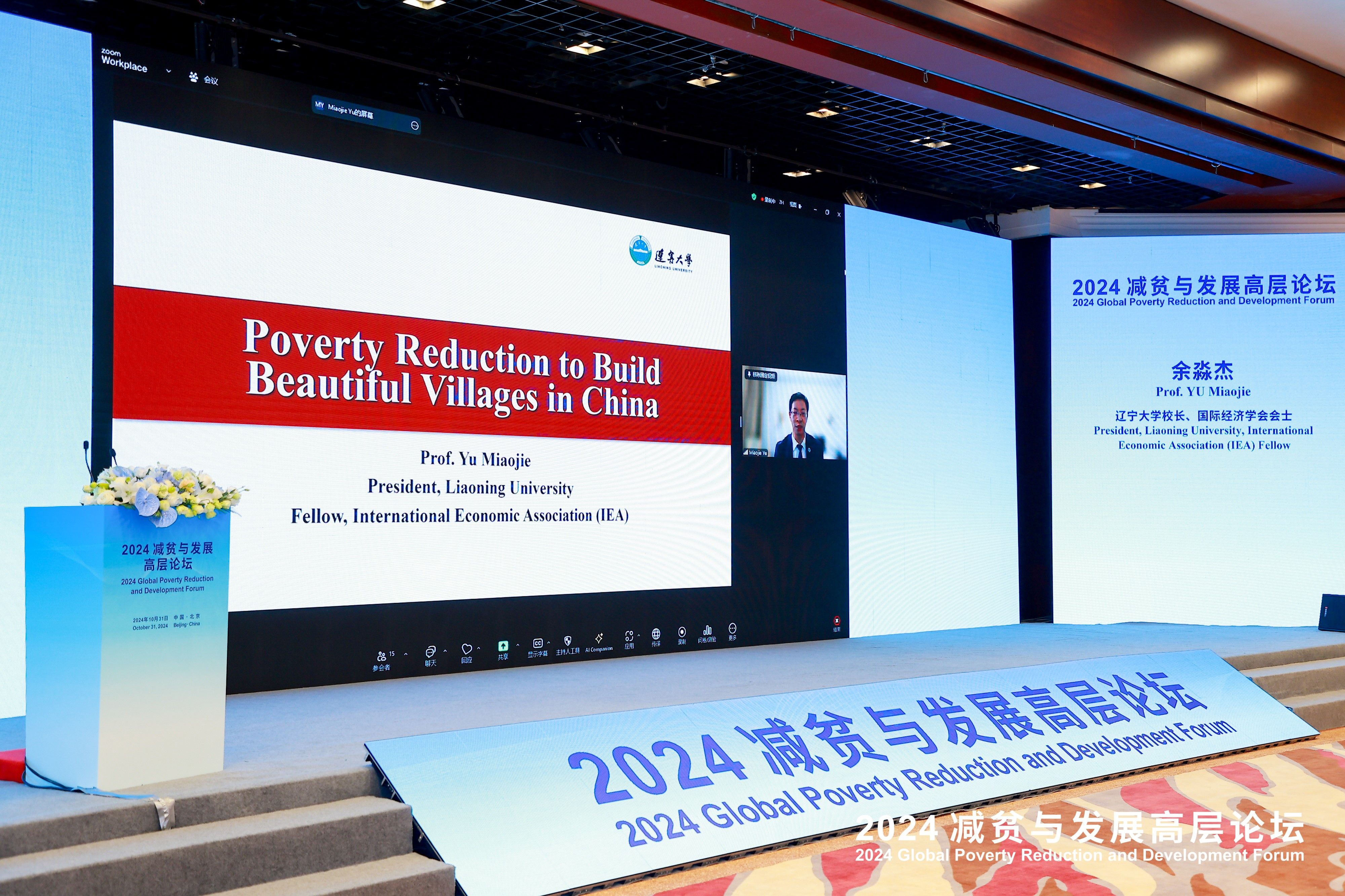On October 31, the 2024 Global Poverty Reduction and Development Forum was held in Beijing. Zhang Zhili, a member of the Party Leadership Group of the Ministry of Agriculture and Rural Affairs, attended the forum and delivered a speech. United Nations Secretary-General António Guterres sent a special congratulatory letter to the forum. Guterres warmly congratulated China on hosting the forum and called on countries to establish people-centered institutions and systems, comprehensively implement the ‘Pact for the Future’, unite as one, and ensure that poverty becomes history.

The theme of the forum was ‘Promoting the Global Poverty Reduction Process and Building Harmonious and Beautiful Villages Together’. Simultaneously, the ‘2024 China-Africa Cooperation Forum: Poverty Reduction and Development Conference’ and the ‘2024 Global Poverty Reduction Partners Symposium’ were held. Representatives from government officials of 30 countries, 26 ambassadors to China, 10 international organizations, as well as experts, scholars, social groups, enterprises, and media outlets attended the forum, totaling 300 participants. Professor Yu Miaojie, a deputy to the 14th National People’s Congress, a fellow of the International Economic Association, Deputy Secretary of the Party Committee and President of Liaoning University, was invited to attend the forum and delivered a keynote speech titled ‘Poverty Reduction to Build Beautiful Villages in China’.

Yu Miaojie pointed out that China’s economy has shifted from a period of high-speed growth to one of high-quality development. The government primarily promotes this around five aspects of the ‘New Development Philosophy’, namely, innovation as the primary driving force, coordination as the intrinsic requirement, green development as an important manifestation, openness as the only way forward, and sharing as the essential requirement. Particularly in the aspect of sharing, China has made significant achievements in poverty reduction and the construction of beautiful villages.
In 2012, China still had nearly 100 million people living in poverty. By 2021, China successfully lifted nearly 100 million people out of poverty, a remarkable achievement reflecting the tremendous efforts and outstanding effectiveness of the nation in poverty alleviation efforts. Yu Miaojie noted that, generally speaking, when a country's per capita GDP exceeds $5,000, poverty alleviation becomes extremely challenging, as economic growth does not automatically equate to poverty reduction, and while the economy may improve, income disparities may widen. However, this scenario has not occurred in China. In fact, the Chinese government has achieved great success in poverty alleviation. While in 2012 China had 100 million people living in poverty, by 2015 the number of impoverished people was still as high as 55.75 million. But by 2021, these people had all been lifted out of poverty. Notably, all 832 impoverished counties in China have successfully removed their poverty status, a great achievement in China’s poverty alleviation efforts.
Yu Miaojie further elaborated that consolidating and expanding the achievements of poverty alleviation is currently a significant task. Data shows that this year, China's rural residents achieved a per capita disposable income of 7,947 RMB, equivalent to more than $1,000. The key to achieving this success lies in two aspects: firstly, in 2022, there were over 16,000 institutions involved in the work of rescuing and supporting extreme poverty-stricken populations; secondly, the number of people receiving care services exceeded 770,000. Once the goal of consolidating and expanding the achievements of poverty alleviation is realized, the construction of beautiful villages can be vigorously promoted. The construction of beautiful villages mainly focuses on three aspects. Firstly, improving living environments. By 2022, the nationwide rural toilet sanitation coverage rate had exceeded 75%. The rural sanitation conditions in Guangdong Province were comparable to those in major cities like Beijing. Secondly, there are 33,917 township health centers, with a total of 1.53 million medical personnel, further ensuring the health needs of rural residents. Lastly, the number of people receiving the minimum living security in rural areas reached over 33 million, with a total expenditure exceeding 14 billion yuan. Additionally, the development in the field of agricultural technology is also driving rural economic growth. In 2022, the total power of agricultural machinery reached 1.1 billion kilowatts, with various large, medium, small, and mixed tractors increasing year by year. In terms of agricultural ecology, the number of households using biogas exceeded 1500, and the number of biogas projects also increased to more than 750,000. The popularity of solar facilities has also significantly increased, with the use rates of solar water heaters, solar houses, and solar stoves continuously rising. Flood prevention and water conservation projects continued to expand, with the areas of flood control zones, soil erosion control areas, and the length of dykes all increasing, ensuring a large number of arable lands.
Yu Miaojie pointed out that rural industrial policies play a crucial role in promoting the construction of beautiful villages. He proposed three key areas. Firstly, the industrialization of agriculture. It is necessary to invest capital, labor, land, and other factors into this sector and increase labor costs, encouraging outstanding talents to return to their rural hometowns. The government supports the formation of leading enterprises, promotes their participation in agricultural industry integration projects, and provides R&D subsidies for companies producing green products, in line with the advocacy of the World Trade Organization. Secondly, the construction of agricultural digitalization. The development of e-commerce has enabled rural residents to enjoy shopping convenience equal to that of big cities, achieving next-day delivery of online purchases, which greatly enhances the quality of rural life. At the same time, smart agriculture has been highly valued and incorporated into the Rural Revitalization Promotion Law. Thirdly, encouraging and developing local advantageous industries, such as tourism and leisure. Since 2010, the government has announced a series of lists of model counties for rural tourism and leisure. For rural areas, the cultivation and branding of competitive agricultural products are particularly important. Through policy support, rural areas are helped to build brands and increase the added value of agricultural products. In terms of industrial integration, Yu Miaojie suggested enhancing the added value of agricultural products through brand loyalty and extending the supply chain, promoting the integration of the primary, secondary, and tertiary industries, and forming industrial clusters.
Yu Miaojie expressed optimism about the rapid development of beautiful village construction in China and hopes that these achievements can provide a reference for other developing countries. He believes that the prospects for the construction of beautiful villages in China are vast and will surely usher in an even brighter future.

Since its establishment in 2005, the China International Poverty Reduction Center (CIPRC), with the support and collaboration of relevant national ministries and international organizations, has hosted multiple high-level forums on poverty reduction and development. Originally known as the China International Poverty Alleviation Center, CIPRC is a directly affiliated institution under the Ministry of Agriculture and Rural Affairs. It was jointly initiated by the Chinese government and international organizations such as the United Nations Development Program (UNDP). The center aims to serve in consolidating and expanding the achievements of poverty alleviation, continuing to advance rural rejuvenation, and implementing the layout of China's major-country diplomacy with Chinese characteristics.
